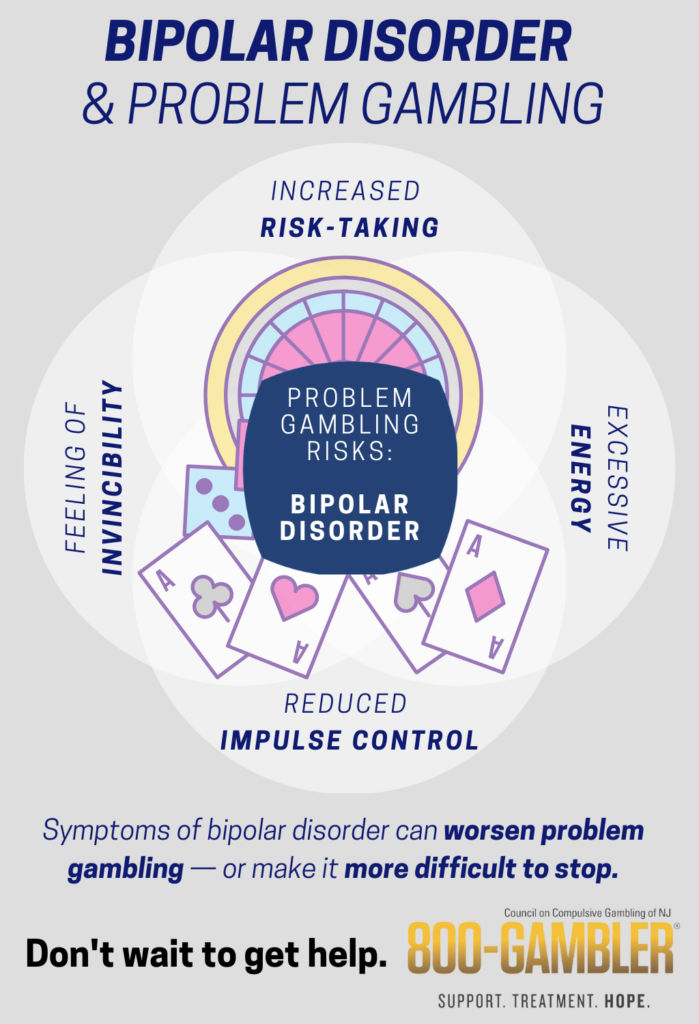Gambling is all about risk and reward. But what if a specific condition made you more likely to risk it all? Much like the connection between problem gambling and depression, connections between bipolar disorder and problem gambling exist — and they can be powerful. Read on to learn about connections between bipolar disorder and problem gambling and how you or a loved one can get help.
Bipolar Disorder: The Facts
You probably know someone who has bipolar disorder. You might even have it yourself. According to 2020 research by the National Institute of Mental Health, approximately 2.8% of US adults have bipolar disorder, totaling over 7 million people.
Bipolar disorder is a commonly misunderstood condition. Sometimes called by its former names manic depression and manic-depressive disorder, bipolar disorder involves a chemical imbalance in the brain causing highs (“manic” episodes) and lows (“depressive” episodes). The intensity of these episodes and their frequency depends on the type of bipolar disorder a person has (either type I or type II).
Even though bipolar disorder is portrayed dramatically by the media, research has shown that people with bipolar disorder are not any more likely to be aggressive, violent, or prone to crime than the general population. Nor do most people with bipolar fit the “split personality” trope that mainstream media often seems to showcase.
Many people diagnosed with bipolar disorder take mood-stabilizing medication to control these mood shifts. Before finding mood-stabilizing medicines, many people with bipolar become frustrated that common medical solutions for depression and anxiety seem ineffective. This sometimes happens because antidepressants and anti-anxiety medications affect bipolar brains differently than non-bipolar ones. When seeking help for bipolar disorder, access to the appropriate healthcare is a necessity.
If you suspect you or a loved one has bipolar disorder, talk to health professionals as soon as possible. Dealing with bipolar disorder may feel overwhelming, but with the right treatment, it’s possible to live a long, healthy, and productive life.
Bipolar Disorder and Problem Gambling
Now that you know a bit more about bipolar disorder, you might be wondering if there are connections between bipolar disorder and problem gambling. While being bipolar does not make someone inherently more likely to have problems with gambling, it is true that people with bipolar disorder do experience greater urges to take risks or engage in thrill-seeking behavior during manic episodes. Some of the links between bipolar disorder and problem gambling come from the following symptoms associated with bipolar disorder:

Reduced Impulse Control
Many people with gambling problems find that their impulse control degrades over time as they play for bigger prizes and keep raising the stakes. People with mental disorders (including bipolar disorder) that are associated with poor impulse control can find it particularly hard to resist the impulse to gamble during manic episodes.
Increased Energy Levels
One unexpected connection between bipolar disorder and problem gambling can occur due to excessive brain activity that happens during a manic episode. During periods of mania, people with bipolar disorder experience heightened energy levels. The chemical consequences of the “manic high” can drive someone with bipolar disorder to gamble for a longer time — and with greater consequences. If there are no brain signals telling someone when to sleep, they’re much more likely to stay at the casino all night. This not only exacerbates the link between bipolar disorder and problem gambling; it also affects the person’s health due to a lack of sleep.
Feeling of Invincibility
Many people with bipolar disorder describe how manic episodes give them a feeling of invincibility — as if they can do anything. If someone feels more likely to win, they are more likely to gamble irresponsibly with the assumption of an eventual “big win.”
Coping with Depressive Episodes
When people who have bipolar disorder are in the middle of depressive episodes, they may experience some of the unfortunate connections between problem gambling and depression as they figure out how to recoup financial losses. They might also engage in problem gambling to feel joy or satisfaction during a depressive period.
Get Professional Help Today
Whether or not bipolar disorder is involved in your particular situation, if you’re tempted to gamble irresponsibly, call 1-800-GAMBLER right away. While many people know that problem gambling can harm their own lives, there are people who are unaware of how gambling affects families — in fact, it can affect even the youngest of children.
If you’re feeling the urge to gamble or you’re dealing with a family member’s gambling problem, reach out to our confidential 24/7 helpline today. There is hope, and we’re here to help.



